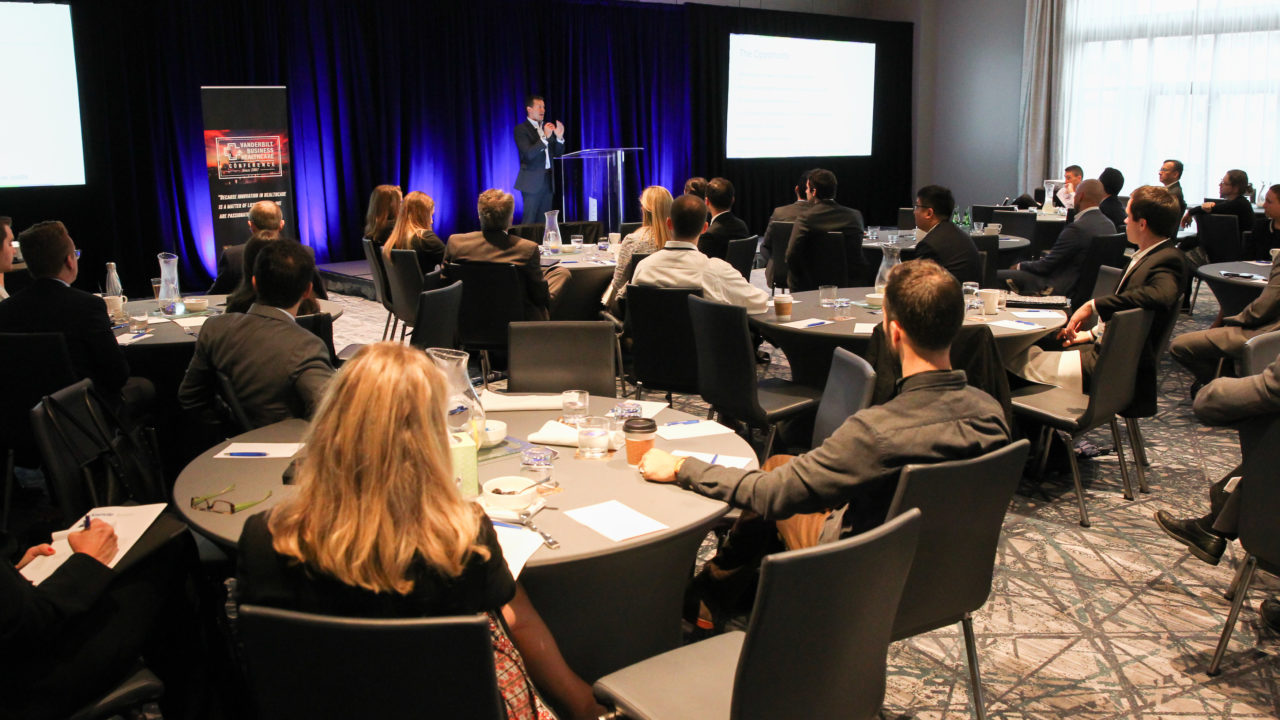By Kara Sherrer
On November 3, health care students and industry professionals convened at the Aertson Midtown hotel for the Vanderbilt Business Healthcare Conference. Organized entirely by Owen MBAs, this year’s conference focused on “Disrupting Healthcare: The Radical New Ways to Consume and Deliver Healthcare.”
Attendees gained insights from five different speakers, as well as an MBA career panel featuring healthcare recruiters and talent developers. Each presentation focused on a different aspect of the disruptions coming to the health care industry.
The conference concluded with a career fair and networking happy hour, where attendees connected with representatives from major health care companies, including Brookdale Senior Living, Cardinal Health, DaVita, HCA, UHS, and more.
The Speakers
Dr. Peter Pronovost, Armstrong Institute for Patient Safety and Quality at Johns Hopkins
“Innovation, to me, is ideas with impact,” he said, describing how you must bring diverse disciplines together to solve a problem. He focused on three narratives that the health care industry must change before it can improve patient outcomes: first, that patient harm is inevitable rather than preventable; next, that patient safety is a local project rather than an integrated operating management system; and finally, that patient safety is based on the heroism of clinicians rather than the design of safe systems.
Dr. Brian Fengler, EvidenceCare
An emergency room physician, Dr. Fengler stepped away from clinical practice 18 months ago to focus on his company EvidenceCare, a clinical decision support tool that delivers patient-specific evidence to the provider. In his talk, he discussed the statistics that inspired him to start EvidenceCare: Only 20% of care delivered is evidence-based, and providers are 7-10 years behind guidelines; in fact, doctors would need to read 160 hours a week just to stay abreast of the current research literature. “Providers are making decisions every single day at the bedside that impact the lives of patients, but we lack that (evidence-based) information,” he said.
Dr. Brent James
Dr. James, former Chief Quality Officer of Intermountain Healthcare, opened his presentation by describing the five main factors that contributed to an individual’s health. Behavior and personal choices influence about 40% of health, genetics 30%, physical and social environment 20%, and the health care system and delivery 10%. He outlined a new model of health care that addresses all of these factors to improve patient outcomes. While he acknowledged the challenges in the industry, he also ended on a note of encouragement. “I wish I was entering the field right now. We’re going to go far,” he said. “I’ll leave you with one thought: We could be dramatically better. That’s our task, that’s our goal.”
Dr. Jesse Spencer-Smith and Kim C. Sheehan, Clinical Services Group of HCA
Dr. Spencer-Smith and Sheehan gave a joint talk on the path of data science disruption. They walked attendees through the different steps of disruption: forecasting, machine learning, treatment anomaly detection, real-time prediction, prescriptive analytics, and artificial intelligence. “(Companies) aren’t just differentiated by their health care, they’re differentiated by their analytics,” Dr. Spencer-Smith said of industry players.
Career Panel
Three experts shared insights on the MBA health care recruiting process: Desmond McGroarty (MBA’11), Director of Talent Management at Brookdale Senior Living; Mark Privitera, Business Strategist for the Executive Development Program at Cerner (MBA’17); and Kelly Raulino, Senior Manager of MBA Talent Acquisition for the Redwoods Leadership Development Program at DaVita. They discussed how the MBA degree gives graduates a broad perspective, which can be a significant advantage in such a siloed industry. “How we can take another industry’s learnings, and apply it to health care?” Privitera asked.
To learn more about the health care concentration at Vanderbilt business, check out our story about the recent Health Care Immersion program.
